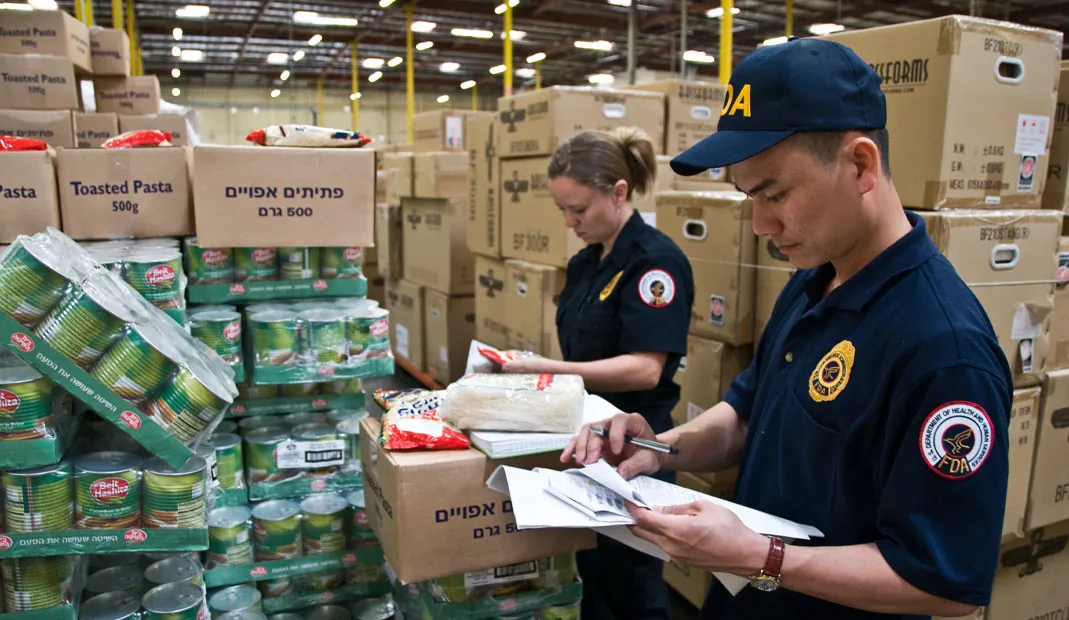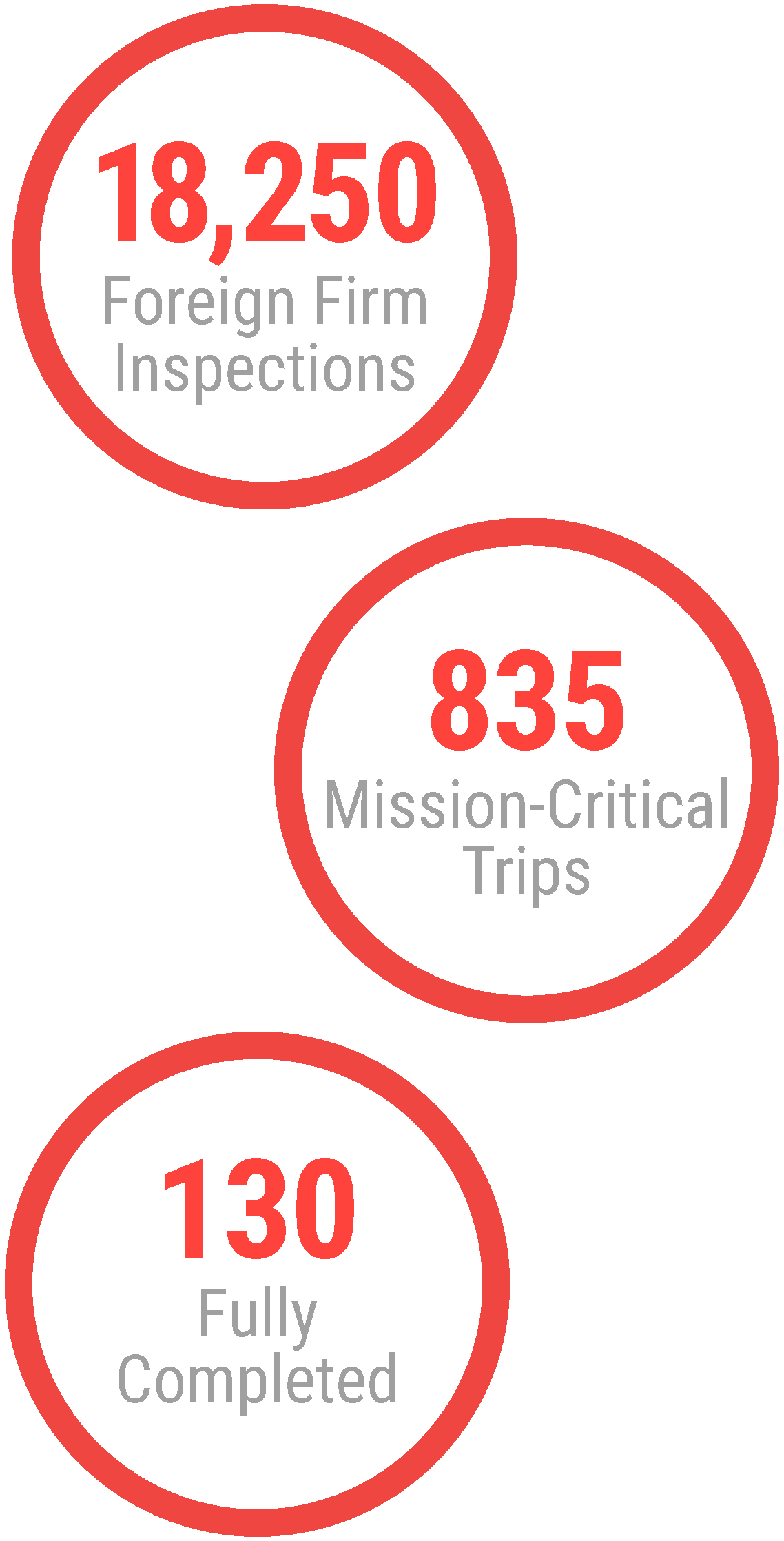Challenge:
The United States is a heavy importer of products manufactured or grown worldwide to be consumed by the American public. Our client is responsible for the coordination and planning of foreign inspections of the firms and plants manufacturing or processing regulated goods.
An inspection trip can include up to 10 firms, and coordinating a trip across multiple agencies and offices can take 50 to 90 days. Delays in any aspect of planning can prevent country clearance from being obtained in a timely manner, threaten the completion of an inspection trip, and leave risks from imported products unchecked. Over 5,000 users collaborate to complete the processes defined by our client for these inspections to help ensure the safety of American consumers.
Our client conducted more than 3,900 inspections of foreign firms in FY 2019, with the number increasing yearly. They did not have an enterprise-wide solution to track all foreign inspections across its program offices. Only one of the program offices used a pilot SharePoint-based system to plan and coordinate their inspections, while the other program offices planned their inspections manually. The SharePoint pilot system was not scalable, was hard to maintain, had bad performance metrics with low capacity, and was often unreliable. Users were dependent on multiple disparate Excel spreadsheets, PDF documents, and emails to track foreign trip information, firm information, personnel logistics, travel details, budget details, etc. Additionally, because the different program offices receive their inspection assignments and goals from different centers, there were many inefficiencies and delays as work planners tried to respond to the various processes.
Using manual systems to plan foreign inspections, our client struggled to manage the complex logistics of foreign inspections. Inspections could be burdensome on manufacturers (especially if they make several different products). Since our client inspections had the potential for duplicated effort and the inability to inspect high-risk sites created concerning challenges for the health and safety of consumers. Also, inspectors sometimes faced daunting travel schedules and less optimal and costly travel routings. Our client carefully plans where and how to allocate the efforts of its inspectors to best prevent unsafe products from reaching American consumers. The manual processes were not consistently ensuring the best use of the inspectors’ efforts. Occasionally, inspections were canceled because the proper coordination with foreign authorities who must authorize travel and access to manufacturing facilities within their borders could not happen.

Solution:
REI and our client collaborated to create the Foreign Inspection Planning and Scheduling System (FIPSS), a web-based application that supports the tracking, planning, and coordination of foreign inspections.
Harnessed Human Center Design
We coupled technical elements, such as software quality, with user-centric features, such as usefulness and ease of use, while maintaining complete alignment with our client’s business goals. REI leveraged human-centered design methods in our agile development process to guarantee user satisfaction and adoption. We engaged with FIPSS stakeholders to define the desired business impact and understand the seamless user journey. REI proactively and regularly communicated changes to stakeholders and provided training support for the new processes.
Built a Cloud-Native, Open Source Application
We collaborated to design a new inspection planning and scheduling system using cloud-native, open source .Net and Angular technologies with a modular microservices architecture. We created the application using Domain Driven Design (DDD), which allows ORA to change business logic quickly and independently without impacting other modules or applications.
Automated CI/DC Pipeline and Testing

Also, over 90% of testing for the application is automated, making the software development process both more efficient and secure.
Created an Interoperability Ecosystem for Better Collaboration
REI helped integrate FIPSS with other agency applications, including the Firm Management System (FMS), Inventory of Data Assets (FIDA), and ORADDS (a consolidated data repository). REI successfully helped bring together disparate groups of people and programs–using an Agile approach to help create a sense of collaboration and harmony between FDA components that had not always worked optimally together. This collaboration, along with the effective integration of multiple systems, means that the agency now has reports available within the application that provide the most up-to-date management information, transparency, and reporting (using the agency’s chosen Tableau data presentation and visualization platform).
Designed Streamlined Processes for Greater Productivity
We designed FIPSS to help our client gain better efficiencies by allowing it to group together several factories that are geographically near each other and assign a single inspector to visit them to ensure compliance with requirements from several different components of the agency. Previously, various agency components were not able to coordinate inspection efforts. Thus inspectors spent much more time and money traveling which reduced the number of inspections. In addition, REI designed the geographical components within FIPSS to run off of latitude/longitude coordinates and implemented the geocoding of addresses when necessary to provide more accurate location identification of the foreign firm. In previous situations, a foreign firm inspection might be canceled if the inspector could not properly locate the firm.
Provided Our Client With New Digital Capabilities
FIPSS provides our client with enhanced and automated capabilities, including:
- Firm Inspection Case Management
- Competent Authority Management (a competent authority is typically the government of a foreign country within which inspections take place)
- Trip and Traveler Management
- Trip Coordination
- Self-service reports are available via a Tableau integration (versus an MS Excel download)
Impact:
The FIPSS application made a significant impact at the agency. Because of FIPSS, our client gained new digital capabilities that made inspections extremely efficient so more inspections could be performed with the same amount of resources. FIPSS leveraged modern cloud-native technologies for greater accessibility and scalability. It led the way for automating the software development lifecycle at the agency and greatly improved collaboration and transparency among agency components. The other programmatic benefits achieved from FIPSS include:
A consolidated and easily searchable database to store all firm inspections, trips, and traveler details and status
- Reduces human error by increasing automation across the business processes
- Eases travel burdens and costs on the agency and field employees by grouping inspections together geographically
Over 1,500 staff have a FIPSS account with varying roles to date. Across all program areas, users have added over 18,250 Foreign Firm Inspections to the application and planned over 835 mission-critical trips, with 130 of those trips fully completed.
Copyright © 2023 REI Systems. All rights reserved.



 A consolidated and easily searchable database to store all firm inspections, trips, and traveler details and status
A consolidated and easily searchable database to store all firm inspections, trips, and traveler details and status

